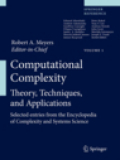
Complex systems are systems that comprise many interacting parts with the ability to generate a new quality of collective behavior through self-organization, e.g. the spontaneous formation of temporal, spatial or functional structures. These systems are often characterized by extreme sensitivity to initial conditions as well as emergent behavior that are not readily predictable or evencompletely deterministic. The recognition that the collective behavior of the whole system cannot be simply inferred from an understanding of the behaviorof the individual components has led to the development of numerous sophisticated new computational and modeling tools with applications to a wide range ofscientific, engineering, and societal phenomena. Computational Complexity: Theory, Techniques and Applications presents a detailed and integrated view of the theoretical basis, computational methods, and state-of-the-art approaches to investigating and modeling of inherently difficult problems whose solution requires extensive resources approaching the practical limits of present-day computer systems. This comprehensive and authoritative reference examines key components of computational complexity, including cellular automata, graph theory, data mining, granular computing, soft computing, wavelets, and more. Provides a one-stop reference covering theory, techniques, and applications. Presents the fundamental tools and approaches that underlie all large-scalemodeling. Addresses a multidisciplinary audience in computer science, pure and applied mathematics, engineering, physics, and economics. Includes a glossary of important terms and a concise definition of the subject for each entry. Gathers together more than 200 peer-reviewed entries from the 11-volume Encyclopedia of Complexity and Systems Science INDICE: Agent-Based Modeling and Simulation. Cellular Automata, Mathematical Basis of. Complex Networks and Graph Theory. Data Mining and Knowledge Discovery. Game Theory. Granular Computing. Intelligent Systems. Probability and Statistics in Complex Systems. Quantum Information Science. Social Network Analysis. 3 entries from the section Social Science, Physics and Mathematical Applications: Minority Games; Rational, Goal-Oriented Agents; and Social Processes, Simulation Models in. Soft Computing. Unconventional Computing. Wavelets.
- ISBN: 978-1-4614-1799-6
- Editorial: Springer New York
- Encuadernacion: Cartoné
- Páginas: 3494
- Fecha Publicación: 13/12/2011
- Nº Volúmenes: 6
- Idioma: Inglés
